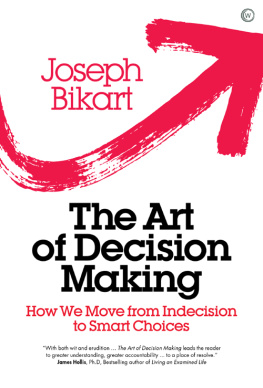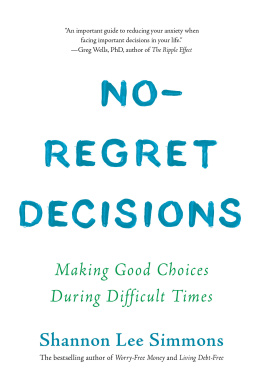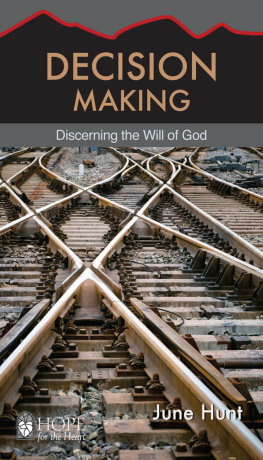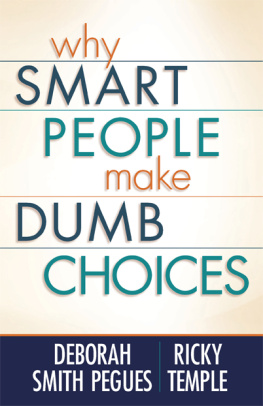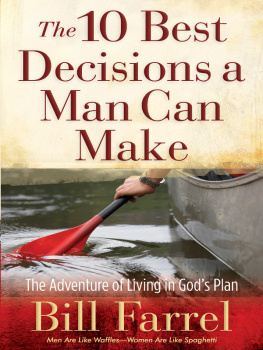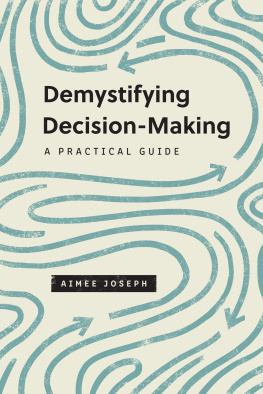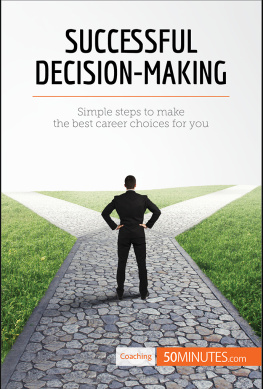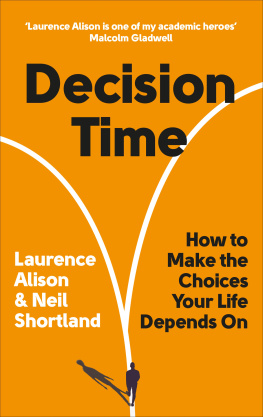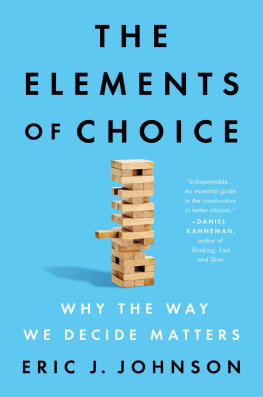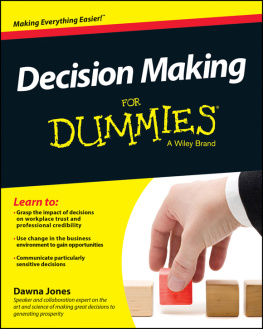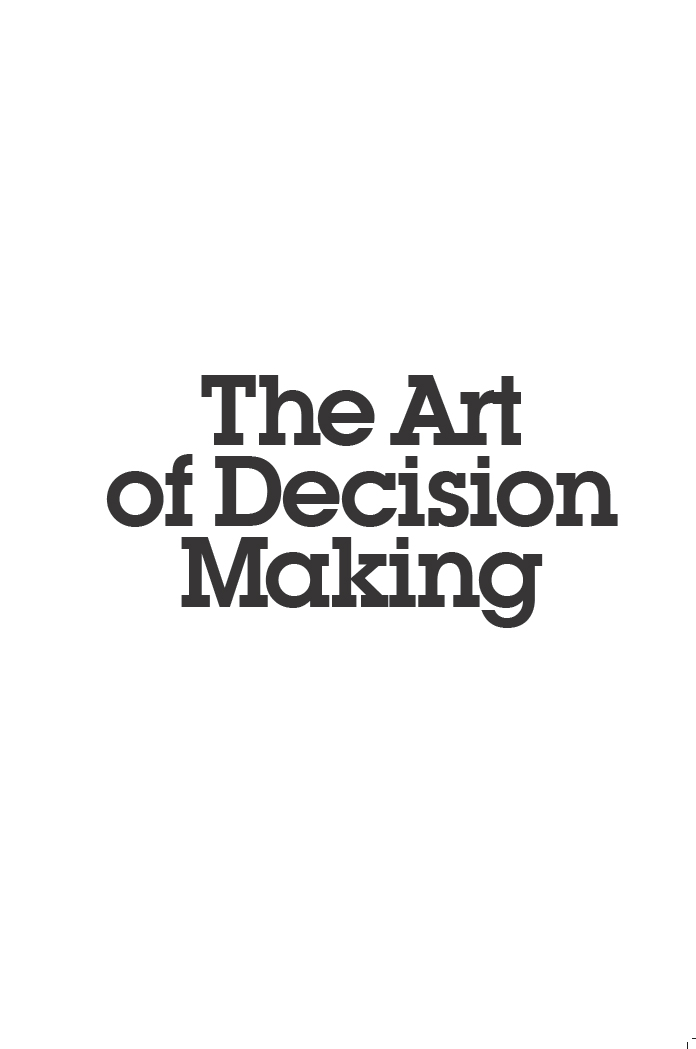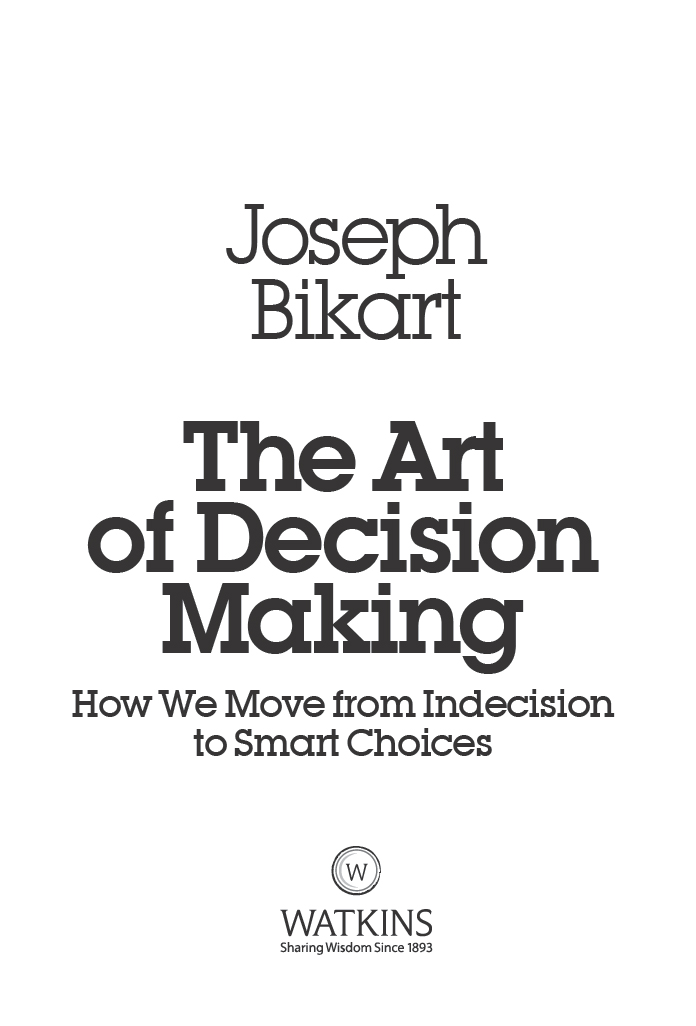There is a Hamlet in each of ustroubled hours where we are called to choose and yet flee that appointment. In The Art of Decision Making, Joseph Bikart explores the anatomy of this perpetual dilemma: which factors lead to choice, and which keep us from choosing? Bikart leads the reader to greater understanding, greater accountability, and greater facility in cutting through the nettlesome thicket of life to a place of resolve.
James Hollis, Ph.D, psychoanalyst and bestselling author of Living an Examined Life
Joseph Bikarts The Art of Decision Making is volatile. It shakes you by the scruff of your procrastination and wilfully wakes you from your slumber of indecision. As Eliots Prufrock soberly reminds us, every decision, even trouser leg style, has within it the potential to activate agony.
Navigating the complex world of how we decide or more urgently, how we avoid decision, is for many of us, a stormy sea. Bikart steers a brilliant course through these difficult waters and delivers his reader to new and clear-blue depths, encompassing the philosophy, psychology and cartography of every dimension of decision making. The best decision you will make today will be to clear your decks, inner and outer, and create space to devour this feast of wisdom. By turns erudite, creative, demanding, challenging, practical and insightful, The Art of Decision Making is blissfully relieving of the haunting tension of messy, clumsy and incompetent deciding.
Martin Lloyd-Elliott, Chartered psychologist, psychotherapist, business coach and bestselling author
On this journey of self-discovery, Joseph Bikart starts quietly, asking at first why we struggle with decisions and inviting us to listen to our own answers; with increasing intensity, he guides us further into our selves, revealing the opportunities that decisions can represent in our lives; and by the end, he reaches a thundering crescendo in which he summons the power of the will to transform the world! No wonder that he can work magic for his clients, of whom I am proud to be one.
Hugh Verrier, chairman of the global law firm White & Case
Joseph Bikart is a founding partner and director of the international consulting firm Templar Advisors. For the past 20 years, following a first career in investment banking, he has advised leaders in corporate and public life on their communication and negotiations. Through his work with thousands of decision-makers, he has created Decisiology, an innovative approach to executive coaching, drawing on his studies at the Institute of Psychoanalysis and at the Tavistock in London. He is also a keynote speaker, and a lecturer at the London Business School and he holds a masters degree (hons) from ESCP Europe.
NOTES TO THE READER
This book presents a continuous argument, and is best read in its entirety. However, as on any long journey, signage can be helpful here and there. The occasional Orientation Points underline some of the main points of the thesis in everyday language related to practical decision making. They are tips, for easy consumption.
In addition, the book includes six Key Skills essays, contributed by lifestyle writer Mike Annesley. These are intended to offer practical decisionmaking guidelines consistent with the argument of the main text. They should be seen as complementing or counterpointing the main text, from a less philosophical perspective, rather than straightforwardly illustrating it. The essays are positioned to reflect some of the broad points made in the chapters that precede them. Each essay is headed with a relevant quotation from the book, with a page reference.
ACKNOWLEDGEMENTS
Thanks are due to:
Martin Lloyd-Elliott for encouraging me to write this book, and for his unfailing and generous support
James Hollis for inspiring me to write in the first place, and for his enlightening wisdom
everyone at Templar Advisors, the dream team I feel blessed to work with every day
the friends, relatives, clients and colleagues whose advice and
feedback have been invaluable: Antti Ilmanen, Malka Napchan, Katherine Green, Jessica Jackson, Simon Eagles, Michael Knipe, Wylie OSullivan, Isabelle Bikart, Reyne Krob, Paula Krob, Ruth Goetz, Hugo Jackson, Pierre Morgan-Davies, James Patrick, Russell Ross-Smith, Johnny Ryan, Donna Fischetto, Adrien Mastrosimone, Stphane Ducroizet, Cyrille Jaman, Leo Rom, Daniela Shayo, Hugh Verrier, Mikki Mahan, Monique Villa, Andrea Kracht, Neil Mackinnon, Suzanne Hull, Virginie Puertolas-Syn, Chlo Ducroizet-Boitaud, Nicola Foster, Sbastien Desprez, Alexandre Rieunier, Justine Smith, Anne Longfield, Vanessa Garet, Quentin Besnard, Thierry Morel, Damian Alexander
my agent, Cathryn Summerhayes at Curtis Brown
my publisher, Jo Lal at Watkins and her team, with special thanks to Bob Saxton.
Finally, most of all thanks to my parents, to whom it would take an entire book to express my deep gratitude, love and respect.
CONTENTS
PROLOGUE
Human freedom involves our capacity to pause between stimulus and response and, in that pause, to choose the one response toward which we wish to throw our weight.
Rollo May, psychologist
Where you are today, in your personal and professional life, is the result of decisions you once made. Where you will be in the future depends on the decisions you are about to take.
Various aspects of our lives seem to escape this reality. Our health, for example, is strongly influenced by our genetic make-up. But it also depends on our lifestyle choices, such as the foods we eat or the exercise we take.
Sometimes our path is interrupted by fate. We are sidetracked away from our chosen road. But even then, it is our response to such events, more than the events themselves, that shapes our destiny.
Every facet of your life depends on the decisions you take. Yet how often do you pause to reflect on your ability to make smart choices? If your answer is not enough, you are in good company.
When I first told my friends and clients I was writing a book on decisions, the news provoked two types of reaction:
I desperately need this. Please hurry up!
or this variation:
I know someone who really needs this (generally referring to a husband, wife, colleague, boss, son-in-law or the like).
We all face challenging decisions from time to time, even though their frequency and intensity may differ. This is not an admission of weakness or inadequacy. On the contrary, these moments indicate we are in the right place. They are a sign that we are engaged in a process that can be unsettling but can also stretch us and help us to grow. A world without challenging decisions would be terribly dull and stale.
The real question is not whether we face such choices, but how. This is the territory well explore together.
This book is about human volition volition being the power to use ones own will in order to make decisions.
The link between will and decision is well established. We find it in the expression, Where theres a will, theres a way, as well as its French equivalent, Vouloir, cest pouvoir (If you will, you can). But we also know that we sometimes stumble, that the link may be broken, and that however much we want something, we can find it hard to transform our will into action.
As a result, we end up with a list of unrealized dreams, a repository of regrets, which makes us question our own ability to take important decisions.
Next page
